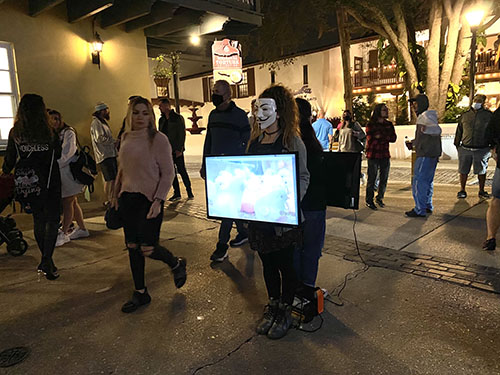By Elisabeth Shirley
In downtown St. Augustine, you might find animal-rights activist group Anonymous for the Voiceless (AV) holding digital screens displaying clips exposing the innerworkings of animal farms and slaughterhouses.
AV is a worldwide organization that advocates for animal rights by exposing the cruel truth behind the animal industry to encourage people to reevaluate what they eat. Hungry to see the vegan community grow, there are currently eleven AV chapters in Florida alone.
Logan Brown, organizer for the St. Augustine chapter of AV, says he was inspired to become an activist over three years ago after witnessing a one-man disruption in a restaurant he was eating at. After learning about AV, he decided St. Augustine was just the place to spread his message.
“It’s probably, even today, the most successful AV area to do activism in the country,” Brown said.
Protesting downtown opens up the opportunity for AV to influence a lot of people due to the foot traffic. Brown and his group come about once a month to expose the graphic scenes of animal exploitation and to discuss veganism.
The Cube of Truth protests involve the chapter members to hold screens that play different clips of animals being processed for consumption. Some members wear identity-concealing masks, popularly known as the Guy Fawkes mask, to be a voice for the voiceless. People then can have voluntary discussion about what they are seeing.
“We would seriously convert at least a handful of people and it became so easy,” Brown said. “I got pretty good at conversation. You don’t look at it as bait, but as a one-on-one adult conversation.”
According to GlobalData, there’s been a 600% increase of those who identify as vegan in the U.S. between 2014 and 2017, something Brown says AV has contributed to.
“Since AV came about, five or six years ago, there’s been a rise in veganism worldwide. In my opinion it’s no coincidence because we’re in every major city.”
When asked if the future is vegan, Brown says that although we have seemed to regress (we eat more meat now than ever, according to The World Counts), we are headed in that direction.
“Fifty years from now, I would see us definitely mostly plant-based. A lot like slavery or oppression of certain races and women back in the day, we can keep going, we don’t have to stop where we’re at now,” Brown said. “Of course, vegans are going to say this, but to us it’s obvious.”
One of the biggest obstacles for vegan activism is the filtering of the animal industry. Many of the footage AV uses is from Australia, which can be confusing when trying to promote veganism in the United States. Australia’s animal processing is generally considered more humane when compared to other countries’ practices.
“There are probably more laws that are passed against activists and open-source footage than there are laws that protect the animals. It’s very telling.”
Brown says that he has not looked to expand into social media at the moment and prefers to have discussion face-to-face.
“People [on social media] are not looking to expand their consciousness, they’re basically looking to solidify what they think they already know, not to learn.”
Being an activist has led Brown to have many meaningful encounters for AV with people who made the decision to become vegan.
“There was one lady in Gainesville at one of my first Cube of Truth protests. She was the passenger of a car driving by and she saw one of the screens. She told the driver to stop, in the middle of the road, and he did . . . she stared at the screen and just started bawling,” he said. “Instantly vegan, on the spot.”
Brown hopes to have activism become a central part of his life to help for the vegan movement.
To learn more about Anonymous for the Voiceless:
www.anonymousforthevoiceless.org
Is Veganism the Future?
 Two Anonymous for the Voiceless activists holding screens displaying animal exploitation, downtown St. Augustine.
Two Anonymous for the Voiceless activists holding screens displaying animal exploitation, downtown St. Augustine.


Be the first to comment on "Is Veganism the Future?"